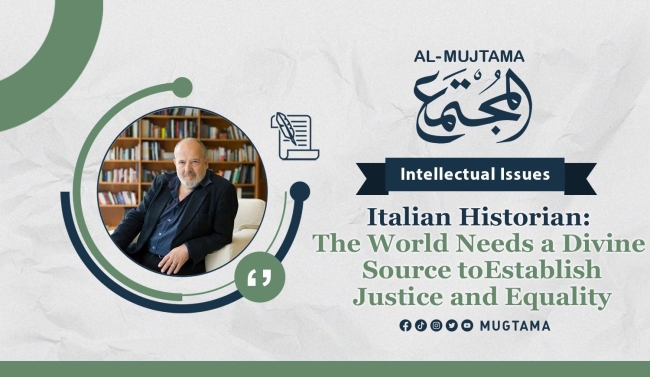Italian Historian: The World Needs a Divine Source to Establish Justice and Equality Featured
Western World Creates Enemies and labels Them as ‘Absolute Evil’
The Italian historian Franco Cardini thinks that the Western world has a habit of creating enemies and labeling them as "absolute evil." He points out that this way of thinking goes all the way back to medieval times. Back then, people used to see their enemies as pure evil, just like how we see villains in movies. But Cardini believes that this way of thinking is outdated and doesn't help us understand the complexities of the world we live in.
Totalitarianism and Liberalism
Cardini also talks about something called "totalitarianism." It's a big word, but it basically means a system where one person or group has complete control and power. He argues that even Western liberalism, which is often seen as a democratic ideology, can sometimes become a form of totalitarianism. It's important to be aware of this and question the things we believe in.
Cardini's Thoughts on Gaza
Cardini firmly criticizes the way the media covers the conflicts happening there. He believes that innocent people, including many children, are being killed every day, and the world is turning a blind eye to it. Instead of talking about democracy or human rights, Cardini invokes the Bible and Gospel stories to express his concern. He believes that appealing to international institutions doesn't always work, and sometimes we need to rely on something bigger than ourselves.
The Flaws of Modernity
Cardini also criticizes "modernity." He thinks that the idea of "equality" and "justice" that modernity is based on can sometimes contradict each other. He believes that we need a third pillar, like brotherhood, to balance things out. But without a divine source, it's hard to make it work. He also questions the way history is written and reminds us to be skeptical and question everything we read.
The Distortion of History
Cardini starts by discussing the history of France during the time of Louis XIV. He explains that history can be manipulated, not just by distorting the facts of the past, but also by twisting the current facts and attaching misleading interpretations to them. This can create false narratives that shape the future.
The Rise of Modernity
Cardini connects modernity to a materialistic mindset that became popular in Europe after the Church faced challenges in the fourteenth century. The Church had to move its headquarters from Rome to Avignon and needed a lot of money to function. To get this money, they turned to banks and borrowing, which led to the rise of extremely wealthy elites.
These elites played a significant role in supporting the Renaissance by funding artistic and scientific activities. This financial revolution opened the doors to modernity and individualism, as powerful states embraced these ideas in the name of progress.
Falsifying Religion and Colonial Campaigns
Cardini also talks about how religion was manipulated during colonial campaigns. He points out that while Christianity was declining or being distorted in Europe, it was used as a pretext for colonization in other parts of the world. He mentions that Freemasonry lodges, which the Church condemned, were widespread during this time. Additionally, European elites were fascinated by satanic doctrines and magical practices from America and Africa.
Defaming Monastic Orders
Cardini highlights how monastic orders were defamed through literature, starting with Voltaire and continuing to modern writers. He believes that modernity aligns with the colonial idea, which is embodied today by the United States.
The United States and Modernity
Cardini argues that the United States, often seen as the heir to the Roman Empire, doesn't share the same political values. Instead, he sees it as a representation of materialistic modernist thought. He compares the United States to a company with branches and representatives worldwide, where the President is more like the Chairman of a Business Council.
The Illusion of a Hidden Group
Cardini warns against falling into the trap of believing in a hidden group that secretly controls the world. He explains that the real power lies in financial institutions, companies, and banks that we all know about.
The Invention of the West
Cardini's book challenges the idea that the West, modernity, and Europe are all the same. He believes that these terms are often used interchangeably, but they actually represent different concepts. He also mentions that there are multiple "West" influences around the world, shaped by local agents of globalization.
Hope for Europe
Despite the challenges, Cardini remains optimistic about Europe's ability to rediscover its authentic values. He believes that Europe can emerge from its current state and find a balance between East and West, just like the light of God described in the Qur'an.
About Franco Cardini
Franco Cardini is an Italian historian and author who has written over 200 books. He is known for his extensive knowledge and has held various positions in universities and research centers. Cardini has also collaborated with major Italian newspapers throughout his career.
Some of his notable works include "From East to West: Islam, Europe, and the United States," "Does Islam Constitute a Threat? No," and "The Hypocrisy of the West: Caliphate, Terror, and History."
Franco Cardini is a historian who used to think critically about the world we live in. He believes that there are injustices happening in Gaza and that we need to question the way we see things.


